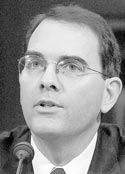Bybee asked to clarify views on interrogation
WASHINGTON -- The chairman of the Senate Judiciary Committee has invited federal Judge Jay Bybee to testify about his role in developing legal memos that set a foundation for harsh interrogations of suspected terrorists during the Bush administration.
Sen. Patrick Leahy, D-Vt., said he would give the Las Vegan the opportunity to set the record straight on his involvement in preparing the memos and how he views them in retrospect.
As head of the Office of Legal Counsel in the Justice Department, Bybee in August 2002 signed two opinions that led interrogators to make use of rough tactics on detainees such as sleep deprivation, shaking them, banging them against walls and making them sense as if they were drowning.
The waterboarding technique has been condemned as torture by President Barack Obama and a number of other leaders. There are some who argue it was not.
One memo Bybee signed concluded waterboarding did not rise to the legal definition of torture, prompting liberal activists and some members of Congress to call for him to step down or be impeached as a Las Vegas-based judge on the 9th U.S. Circuit Court of Appeals.
A second memo Bybee signed that month opined the president as commander in chief had broad authority to approve harsh interrogations and that tactics short of "organ failure, impairment of bodily function, or even death" might be defended as legally acceptable.
"There is significant concern about the legal advice provided by OLC while you were in charge, how the advice came to be generated, the considerations that went into it and the role played by the White House," Leahy said in his letter that was sent to Bybee on Wednesday.
Bybee, a former professor at the Boyd School of Law at the University of Nevada, Las Vegas, was confirmed to the federal judgeship in 2003, two years before his role in the interrogation memos first was disclosed. The memo that detailed how waterboarding and other tactics might be carried out was made public by the Obama administration in early April.
Judiciary Committee spokeswoman Erica Chabot said Thursday that Leahy has not scheduled a hearing but would accommodate Bybee's schedule if he accepts the invitation.
Leahy has not extended an invitation to two other lawyers who served in the Office of Legal Counsel and have been associated with interrogation memos. Chabot said he has not ruled out contacting the two, John Yoo and Steven Bradbury, who no longer work in the government.
Leahy said he was extending the invitation to Bybee following the publication of a story in the Washington Post last weekend that suggested Bybee regretted the memos and felt they were misused. The report was based on accounts provided by Bybee friends and associates.
Subsequently, Bybee broke a long silence in a statement he gave to the New York Times that defended the conclusions reached in the memos. He called them "a good faith analysis of the law" that defined the line between harsh treatment and torture.
"The central question for lawyers was a narrow one: locate, under the statutory definition, the thin line between harsh treatment of a high-ranking al-Qaida terrorist that is not torture and harsh treatment that is," Bybee said in his statement to the newspaper. "I believed at the time, and continue to believe today, that the conclusions were legally correct."
"The contrast between the recent articles ... is striking," Leahy said. "I am giving you the opportunity to come forward and clarify what you meant in your public discussion of these matters, and so that we can establish the facts and get to the truth."
Contact Stephens Washington Bureau Chief Steve Tetreault at stetreault@stephensmedia.com or 202-783-1760.

















